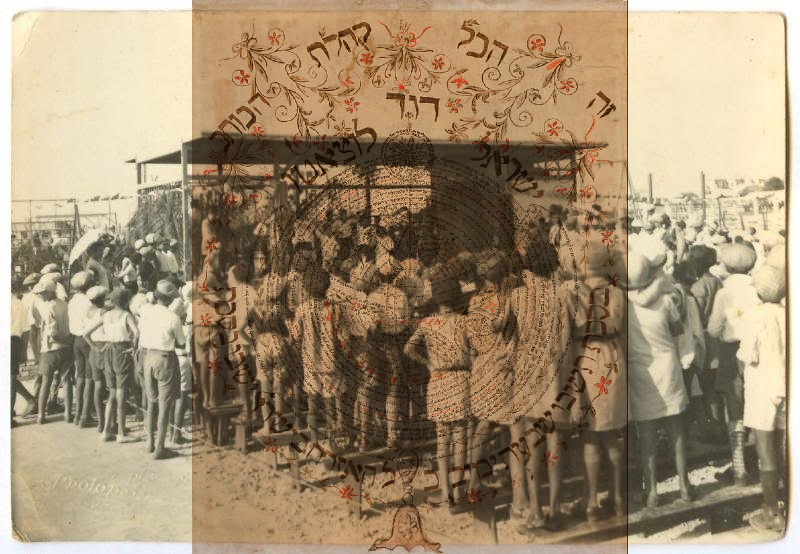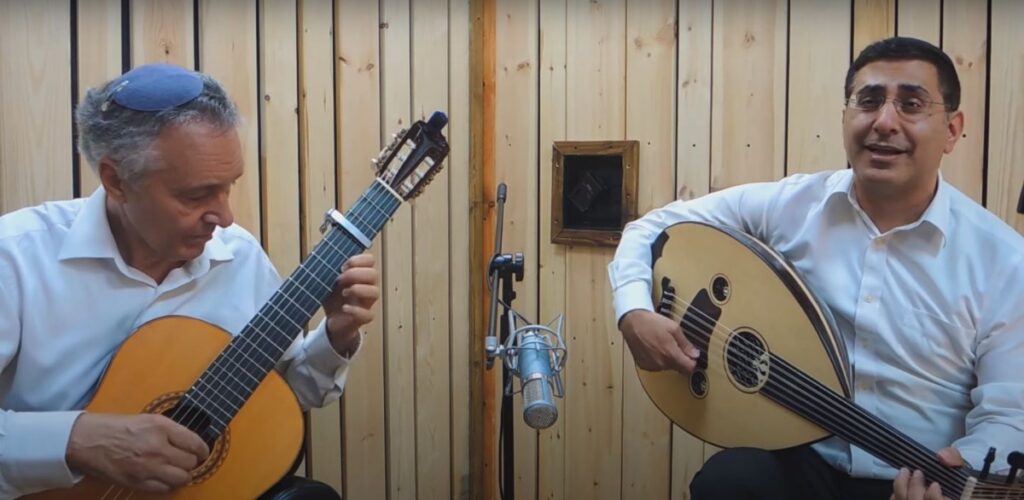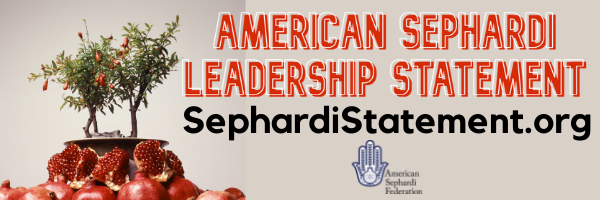Raising the Sukkah of David: Prophecy, Purpose, & Piyyut

!חג שמח
From your friends at
The American Sephardi Federation
In honor of Sukkot, the ASF’s Sephardi World Weekly is pleased to present the following “Letter from the Land of Israel”:
The prophet Amos transmitted God’s promise of future redemption through an unexpected image: “On that day, I will raise the fallen Sukkah of David” (Amos 9:11).
At first glance, one might wonder if perhaps Amos misspoke. The traditional name for the line descending from David is “the House of David,” not “the Sukkah of David.” But Amos didn’t misspeak. What, then, was the meaning of his image?
A Sukkah is the temporary dwelling with an organic, latticework ceiling (the sages want you to be able to see the stars) that Jews build and live in during the seven-day holiday of Sukkot, the festival commemorating the forty years that the Jewish people dwelled in the desert after leaving Egypt. Every year the Jewish people relives the sacred history of its founding generation: on Pesach we leave Egypt, on Shavuot we receive the Law at Sinai, and during Sukkot we dwell in our desert booths.
As for David, he’s the sweet singer of Israel, the young superstar shepherd who killed Goliath, was anointed King, and established God’s musical rule in a Holy City. His son, Solomon, transformed that city, Jerusalem, into the home of what scholars call “Solomonic humanism,” a spiritual-cultural ideal that embraced “enlightenment, adoption of an educational ideal, cultivation of the individual, attention to rhetoric [and] new interest in the natural sciences.”
This is a scholarly articulation of an ideal similar to what animated Rishon LeZion Rabbi Ben-Zion Meir Hai Uziel’s vision of Israel’s teudah, meaning goal or mission: “Judaism’s mission [teudah] is nothing less than the exalted aspiration to elevate humanity… to the highest level of human perfection,” including the “scientific… artistic, economic and aesthetic” dimensions of life, so long as these actions are undertaken “for the sake of heaven.”
So what’s the connection between David and Sukkot?
Continue reading below…
~~~~~~~
Together, we can go
from strength to strength in the New Year!

For more information about sponsorship opportunities: email or leave a message at 212.294.8350. To donate by mail, please send a check payable to “American Sephardi Federation,” 15 W 16th St., New York, NY, 10011
Email us at info@americansephardi.org if you are interested in discussing donating securities or planned giving options with a financial professional from AllianceBernstein.
~~~~~~~
David and Sukkot seem to exist at opposite poles of Jewish history: the founding of the monarchy in Jerusalem versus the generation of the desert.
David’s Kingdom and all that it represents, the political regime whose mandate is to cultivate human powers in gratitude to the Creator of those powers, no longer exists. Amos, however, offers hope. It’s not a house, it’s a Sukkah, the Sukkah of David: temporary, but always capable of being reconstituted because the vision of David’s regime remains, the teudah rearticulated in our time by R’Uziel retains its power and validity. And, therefore, even if David’s kingdom doesn’t presently exist, David’s Sukkah, the man-made temporary dwelling that points beyond itself to the heavens, like a king pointing beyond himself to a higher Power, was never destroyed, was never obliterated, and was never annihilated. It’s only fallen.
During the holiday of Sukkot, we add a sentence to the blessing after meals, a mini-riff offered in response to Amos’ original prophecy: “The Compassionate One, may He raise for us the Fallen Sukkah of David.” The mini-riff on Amos was then transformed into the audacious request addressed directly to G-d and composed last century by R’Yosef Chayim of Baghdad, aka the Ben Ish Chai (1835-1909), Yah et Sukkat David Taqim (“Lord, Raise David’s Sukkah”).
In his piyyut, R’Yosef Chayim enumerates the seven honored guests who are traditionally welcomed into the Sukkah during the seven-day holiday and asks that the Jewish people be redeemed in their merit, from Avraham, Yitzchaq, Ya’aqov, Moshe, Aharon, and Yosef until, on the seventh night, and in the concluding seventh verse of the piyyut, King David.

Finally, in honor of Sukkot, the great contemporary Iraqi-Israeli payytan, musician, and scholar, R’David Menachem, posted on YouTube a wonderful performance of a beautiful new melody that he composed in an Andalusian-Aleppo-style for R’Yosef Chayim’s piyyut, Yah et Sukkat David Taqim.
The American Sephardi Federation is very happy to share with our readers this holiday message and a wonderful, new melody for a song based on Amos’ 2,800-year-old image of the future: may the Compassionate One raise for us the fallen Sukkah of David!
Haj Sukkot Sameah!
The American Sephardi Federation

~~~~~~~
Banner image credit: Israel David Luzzatto’s Sukkah decoration, a micrographic drawing of Kohelet (Ecclesiastes) evoking the movements of the sun, Triste, Italy (Scan courtesy of Google Arts & Culture – The H. Ephraim & Mordecai Benguiat Family Collection, The Jewish Museum; See also: The Posen Library of Jewish Culture and Civilization, Volume 6, p. 389),1775, superimposed over a photograph by Avraham Suskin of a Sukkah being built, Tel Aviv, Mandatory Palestine (Photo courtesy of pitzkale/Ebay), circa 1920s
~~~~~~~

~~~~~~~
Upcoming Events or Opportunities
The Combat Antisemitism Movement, Jazz Leadership Project, and American Sephardi Federation present:
American Excellence
The Omni-American Future Gala
Join us for a night of inspiration, music and excellence honoring Roy Niederhoffer and Emmet Cohen.
Experience an evening of the world-class jazz, music, fine dining., and blues with Coleman Hughes and Itamar Borochov performing with The Emmet Cohen Trio.

Tuesday, 12 November
Cocktail Reception
6:00-7:00PM ET
Dinner & Program
7:00-9:00PM ET
@Ginny’s Supper Club (310 Lenox Ave. NYC)
Sign-up Now!
Tickets: $45-$500
The Omni-American Future Project is a cultural initiative that draws from the vision of Albert Murray and the rich traditions of jazz to build a robust cultural and political center in America. It seeks to counter extremism and division by fostering unity, inclusion, and shared values.